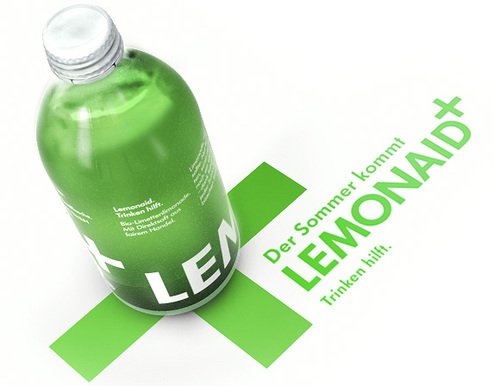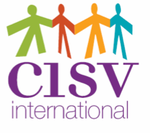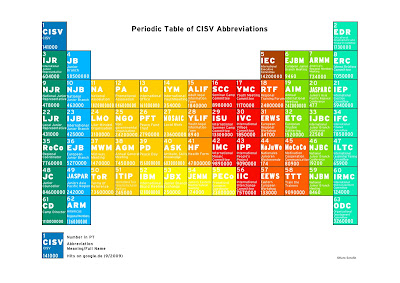September 2009 Archives
A few years ago, there was some frustration in CISV international about the fluctuation of CISV hosting. Many chapters in the world seem to be hosting according to their individual pattern (every year, every second year, every three years), which then through overlaying lead to quite some differences from one year to another. (In physics, I think this is called Interference). On the chapter level, fluctuation results in having a lack of invitations in one year, which leads to less promotion, when in the following year, it's hard to fill the empty spaces. On the international level, it's mainly a financial problem, since the participation fees are our main source of income. While the expenditures for AIM and IO stay mostly the same every year, the amount of collected fees varies quite a bit.
Enter the Global Hosting Plan: Since 2004 the responsibility is given to the regions to align the chapters hosting patterns in order to reduce fluctuation. Let's take a look at hosting numbers to see what we are talking about:
(You may get the impression, that the number of programmes have grown enourmously over this time period, but the "total"-curve's upward trend is mostly a result of lack of Youth-meeting data before 2003)
Check out the big "Tsunami wave" around 1996-1998 in village hosting, which we have been able to avoid happening again, Whether the Global Hosting Plan will help to even the curves out even more, the future will have to tell. It seems like there is a bit of flattening from 2008 on. Is this a good thing?
Even if the Global Hosting Plan seems a reasonable solution, it dose remind me of central planning, communist style: I can remember the GDR publishing big "5-year-plans" on where their economy should develop. However, none of the economies in Eastern Europe managed to get anywhere with this approach before they turned towards market economy.
What also strikes me as odd, is that at this years AIM we are introducing new hospitality points and hosting fees to encourage hosting, which is more of an incentive system than a planned system: How does that go in line with the Global Hosting Plan, that actively discourages some NAs from hosting certain programmes?
It doesn't. And that's why it should be scrapped. Yes, let's get rid of an attempt to plan ahead in time what to host. Because it won't work. Instead, let's try to come up with something like a free market system, that will encourage to host, especially in years, where others won't.
- Give away hospitality points (or host fees) according to the number of programmes hosted. If 10 NAs host Seminar Camps in 2010, they get to split up the pool of hospitality points among them. Then, if 20 NAs host Seminar Camps in 2011, they'll only receive half of the points. Maybe some NA will consider changing their plans.
- Give away hospitality points for camps hosted in the future: let's say, Germany wants to send more Youth Meeting delegations this year (e.g. because they have tons of applicants), they can try to squeeze in another Youth Meeting in the future.
- The most radical concept would be to create a "stock-market" of camp invitations: Let's create a website were invitations can be traded freely: Chapter Darmstadt wants to host a village in 2014: Which chapter wants to participate? And how much are they willing to contribute to the cost of hosting? This system could not only favour countries that manage to host cheaply, but also those with good airline connections, reducing the overall costs of our camps. Furthermore, the system would "learn", which dates, locations are better than others. Finally, if camp evaluations were transparent, chapters could financially profit from hosting good quality camps.
Don't get me wrong, I am a fan of the new system of standardized host fees, hospitality points and penalties. And it does appear a bit obnoxious to complain about a system that was just introduced. But sttill, let's be brave and think ahead in time.
Regular FTB-readers might have observed my obsession with statistics and also my love for TED talks. You can imagine hoe much pleasure I felt, wathcing Arthur Benjamin argue for more statistics in mathematical education. Agreed!
Also in CISV, many people are overwhelmed with the data regarding participation, hosting and our "scientific research" presented during AIMs. A little more experience with statistics could help here a lot.A guy, Anna knows from university, recently quit his job at a large advertising agency and founded a company with a friend and now produces, no joke, lemonade: They spent some time in the kitchen mixing up ingredients, found a funky Swedish design agency that came up with the bottle and logo design and started a more-or-less "viral" marketing campaign in some of Hamburg's coolest hang-outs to spread the news about their product, called LemonAID.

So far everything is great. However, a few weeks ago, I read an article in the German online newspaper SPIEGEL, that calls the LemonAID creators "Social Entrepreneurs". Social, because all the ingredients are fair-traded. But what the hell exactly is a "Social Entrepreneur"? Let's check Wikipedia:
Social entrepreneurship is the work of a social entrepreneur. A social entrepreneur is someone who recognizes a social problem and uses entrepreneurial principles to organize, create, and manage a venture to make social change. Whereas a business entrepreneur typically measures performance in profit and return, a social entrepreneur assesses success in terms of the impact s/he has on society as well as in profit and return. While social entrepreneurs often work through nonprofits and citizen groups, many are now working in the private and governmental sectors and making a real impact on society.
The main aim of a social entrepreneurship as well as social enterprise is to further social and environmental goals for a good cause. Although social entrepreneurs are often non-profits, this need not be incompatible with making a profit. Social enterprises are for 'more-than-profit,' using blended value business models that combine a revenue-generating business with a social-value-generating structure or component. A social entrepreneur in the 21st century will redefine entrepreneurship as we know it due to their progressive business models.
Now that is interesting. The makers of LemonAID recognized a social problem (Lack of fair trade? Or lack of coolness of fair trade? Or even lack of lemonade?), enjoy the fun of creating their own product and company, and using modern business skills to do something good.
As you may read between the lines, I'm highly skeptical on the moral grounds of such "social entrepreneurs". Isn't doing something good itself abused as a marketing tool? Shouldn't fair trade be the standard instead of something exceptional? The motto of LemonAID is "Trinken hilft!" which translates into "Drinking helps!" - wew, it almost sounds like your rescuing a malnourished African war-victim when having a sip.
Before Social Entrepreneurship there was Corporate Social Responsibility (CSR), which went the other way round: First there is a business, then they needed to be social to keep being attractive for customers (and their own employees). Like Coca-Cola and their water projects. For many reasons, I never really liked "Corporate Citizenship" either.
Finally, there's many a voice that thinks fair trade isn't social at all.
Enough ranting.
I do consider myself a pragmatic, so I guess I do have to recognize something good in all this: Better social responsible companies as irresponsible ones! Also, if being morally good sells a product, society seems to be on the right track. Finally, who ever does anything just because its morally good? Don't we all love travelling and partying as a side-effect of our CISV-involvements? And since I brought up CISV, wouldn't some "Social Entrepreneurship" integrated into our non-profit landscape lead to something good?
Back to LemonAID: I'm quite impressed by the stunt of founding a company that creates a new, sexy softdrink, competing locally with giants such as Coca-Cola and Pepsi. And the taste, by the way, is fantastic.
Update: This sign I found in Zurich last week in front of a Starkbuck's says: "Three ways to improve the future of a coffee farmer". Hmmm...what now....LemonAID or Starbucks Latte?

Enter the invention of CMS (Content Management Systems), sometimes also referred to as "back-end" as opposed to the "front-end", which the website visitors sees. The idea is, that not the webmaster, but theoretically anybody with basic computer knowledge can update a website, add pictures, even create new pictures. OpenCMS was installed a few years ago on the CISV server, and many CISV websites including the international ones use it. It sounds great, but unfortunately OpenCMS itself is a bit overwhelming with a million features and actually needs some training before feeling comfortable with it.
The next evolutionary step, I believe, iare services like Weebly. Weebly lets you create a complete website without any technological knowledge, you can even set up a blog. A lot of NJRs have set up websites at blogger.com - which is similarly easy to work with - but limits you to a weblog. With Weebly you get all the web's goodness, like including Flickr pictures, download pages, etc...
I have to admit, I've never used Weebly for anything too long, but I set up a website once, and it took less than half an hour.

Funny, the resemblance with the suggested logo from 2006?

After browsing through the list of free collaboration tools, by the way, I couldn't spot anything revolutionary useful. But please check for yourself.

